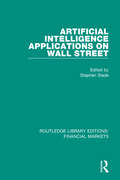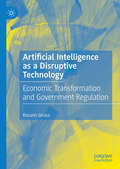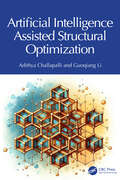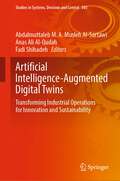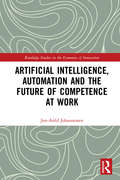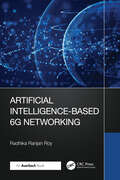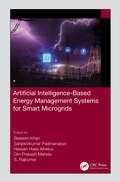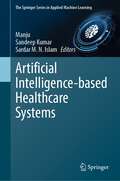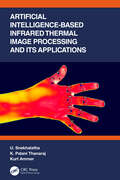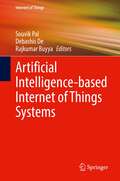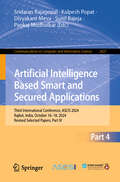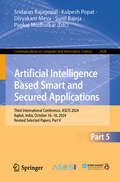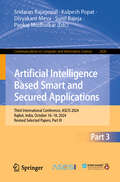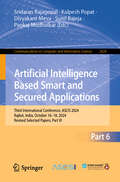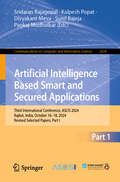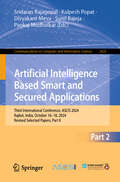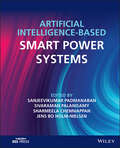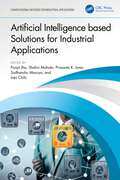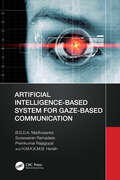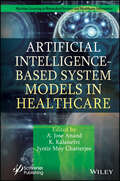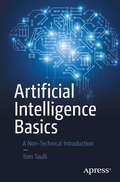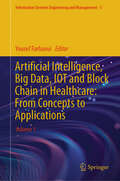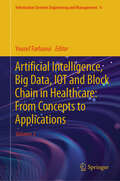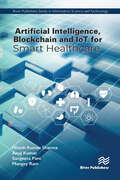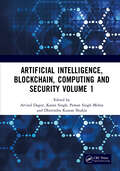- Table View
- List View
Artificial Intelligence Applications on Wall Street (Routledge Library Editions: Financial Markets #16)
by Stephen SladeOriginally published in 1996 as a special issue journal, Artificial Intelligence Applications on Wall Street, presents a series of articles derived from papers at the Third International Conference on Artificial Intelligence Applications on Wall Street. The volume addresses how Artificial Intelligence can be used to address the variety of issues in that arise in the world of investments, such as synthetic instruments, forecasting and surveillance. It examines the potential problems surrounding economic assumption of rationality in a global market, and how artificial intelligence can push the bounds of rationality.
Artificial Intelligence as a Disruptive Technology: Economic Transformation and Government Regulation
by Rosario GirasaArtificial intelligence (AI) is the latest technological evolution which is transforming the global economy and is a major part of the “Fourth Industrial Revolution.” This book covers the meaning, types, subfields and applications of AI, including U.S. governmental policies and regulations, ethical and privacy issues, particularly as they pertain and affect facial recognition programs and the Internet-of Things (IoT). There is a lengthy analysis of bias, AI’s effect on the current and future job market, and how AI precipitated fake news. In addition, the text covers basics of intellectual property rights and how AI will transform their protection. The author then moves on to explore international initiatives from the European Union, China’s New Generation Development Plan, other regional areas, and international conventions. The book concludes with a discussion of super intelligence and the question and applicability of consciousness in machines. The interdisciplinary scope of the text will appeal to any scholars, students and general readers interested in the effects of AI on our society, particularly in the fields of STS, economics, law and politics.
Artificial Intelligence Assisted Structural Optimization
by Adithya Challapalli Guoqiang LiArtificial Intelligence Assisted Structural Optimization explores the use of machine learning and correlation analysis within the forward design and inverse design frameworks to design and optimize lightweight load-bearing structures as well as mechanical metamaterials.Discussing both machine learning and design analysis in detail, this book enables readers to optimize their designs using a data-driven approach. This book discusses the basics of the materials utilized, for example, shape memory polymers, and the manufacturing approach employed, such as 3D or 4D printing. Additionally, the book discusses the use of forward design and inverse design frameworks to discover novel lattice unit cells and thin-walled cellular unit cells with enhanced mechanical and functional properties such as increased mechanical strength, heightened natural frequency, strengthened impact tolerance, and improved recovery stress. Inverse design methodologies using generative adversarial networks are proposed to further investigate and improve these structures. Detailed discussions on fingerprinting approaches, machine learning models, structure screening techniques, and typical Python codes are provided in the book.The book provides detailed guidance for both students and industry engineers to optimize their structural designs using machine learning.
Artificial Intelligence-Augmented Digital Twins: Transforming Industrial Operations for Innovation and Sustainability (Studies in Systems, Decision and Control #503)
by Abdalmuttaleb M. A. Musleh Al-Sartawi Anas Ali Al-Qudah Fadi ShihadehPresently, we stand on the threshold of a technological revolution that will drastically change the way we live, work, and communicate with each other. By the current rate, scope, and complexity, this transformation will be as fundamental for society as any other technological paradigm change from the past. The industries which are more susceptible to change are technologically oriented industries including banking, finance, accounting, and auditing. One of the technological concepts of the technological revolution is the concept of the digital twin.The application of digital twins and AI as paired with Internet of Things technologies makes it possible to solve ESG problems on a completely different level (Li, 2019) for accounting firms and financial institutions. These include recycling on demand, rational energy consumption, smart surveillance cameras for crime tracking, and smart branch parking solutions, monitoring the wear and tear and conditions of financial technology infrastructures.Moreover, numerous researchers and practitioners emphasize the significance of innovating sustainable business models and operations (Geissdoerfer et al., 2018). The digital twin will allow businesses and financial institutions to minimize costs, boost customer service, and find new ways to generate revenue. DTW is accessible now more than ever, and many reputable and innovative companies such as Tesla, Ericsson, and Siemens have adopted it with varying success.Therefore, this book examines the opportunities, challenges, and risks of artificial intelligence-augmented digital twins for financial operations, innovation, and sustainable development. It focuses on AI and digital twin technologies to furnish solutions for the current industrial revolution including the Metaverse. Henceforth, this book aims to encourage authors to submit multi-disciplinary chapters indicating the current scholarly challenges about the applications and potential of artificial intelligence and digital twins in accounting, finance, and banking.
Artificial Intelligence, Automation and the Future of Competence at Work (Routledge Studies in the Economics of Innovation)
by Jon-Arild JohannessenArtificial intelligence and the autonomous robots of the Fourth Industrial Revolution will render certain jobs and competences obsolete but will also create new roles, which in turn require new sets of skills. They will also transform how we produce, distribute and consume, as well as how we think. Rather than a linear understanding of evolutionary processes, we will develop a more interactive and circular interpretation. This book offers a unique and holistic perspective on the future of work in the context of industry 4.0. It discusses the globalization of capital markets, how artificial intelligence can help organizations to be more competitive and the new role of leadership in this technological landscape. The author argues that there are four categories of competences, which will be required in order to maintain the relevance of human skills and expertise in the innovation economy. The new jobs that come into being will lend themselves to a particular set of skills. General competences will be necessary for roles involving the 4Cs of communication, creativity, collaboration and change. Specific or STEM competences will be called for across the science, technology, engineering and mathematics sectors. Human competences will lend themselves to positions comprising the SELC framework of social, emotional, leadership and cultural skills. Critical or REVE competences will be in demand for roles embracing reflection, ethics, values and the environment. The book provides a human-centric view of the current technological advancements of artificial intelligence and robotics and offers a positive outlook for human actors seeking continued relevance. It will appeal to scholars and students of the innovation economy, the knowledge society and the coming Fourth Industrial Revolution.
Artificial Intelligence-Based 6G Networking
by Radhika Ranjan RoyArtificial Intelligence-Based 6G Networking focuses exclusively on the upcoming sixth-generation (6G) network and services slated for implementation by 2030. It explores the paradigm shift that is 6G. It discusses the deep integration of computing and communication, supported by artificial intelligence (AI) across network elements like cloud, edge, and terminals. It also examines how AI-native interfaces will permeate various network components, from radio access networks to application servers and databases.Proposing a unified AI-enabled framework for optimizing networks and applications as a single integrated system, the book covers how network service providers can tailor network baselines, reduce noise, and accurately identify issues. The book delves into the potential of AI-driven networks to self-correct, predict, and rectify service degradations proactively, enhancing uptime and troubleshooting efficiency. It outlines the “Connection, Communication, Collaboration, Curation, and Community” framework to enhance network effects, aiding operators in automation, cost reduction, and providing optimal user experiences.Covering topics from MIMO and Massive MIMO to holographic communications, cybersecurity and quantum communications, the book explores cutting-edge technologies shaping the future of 6G networks. It anticipates a future where AI, along with machine learning and deep learning, enables continuous learning, self-optimization, and predictive maintenance, even with full automation, that will be the hallmark of a new era in network connectivity and innovation.
Artificial Intelligence-Based Energy Management Systems for Smart Microgrids
by Baseem KhanModeling and optimization of energy management systems for micro- and mini-grids play an important role in the fields of energy generation dispatch, system operation, protection coordination, power quality issues, and peak demand conflict with grid security. This comprehensive reference text provides an in-depth insight into these topics. This text discusses the use of meta-heuristic and artificial intelligence algorithms for developing energy management systems with energy use prediction for mini- and microgrid systems. It covers important concepts including modeling of microgrid and energy management systems, optimal protection coordination-based microgrid energy management, optimal energy dispatch with energy management systems, and peak demand management with energy management systems. Key Features: Presents a comprehensive discussion of mini- and microgrid concepts Discusses AC and DC microgrid modeling in detail Covers optimization of mini- and microgrid systems using AI and meta-heuristic techniques Provides MATLAB®-based simulations on a mini- and microgrid Comprehensively discussing concepts of microgrids with the help of software-based simulations, this text will be useful as a reference text for graduate students and professionals in the fields of electrical engineering, electronics and communication engineering, renewable energy, and clean technology.
Artificial Intelligence-based Healthcare Systems (The Springer Series in Applied Machine Learning)
by Manju Sandeep Kumar Sardar M. N. IslamThis book explores new applications in the field of science and technology for healthcare systems. The main focus of this book is to devise smart, efficient and robust solutions for the health care sector to serve the major population of rural areas. Artificial Intelligence-based Healthcare Systems encourages scientists, engineers, and scholars across the multiple disciplines to design smart intelligent innovations on rural healthcare issues and motivate to collaborate multiple ideas to design best solutions. It also helps the readers at various levels of knowledge to further enhance their understanding for new tools and smart solutions.
Artificial Intelligence-based Infrared Thermal Image Processing and its Applications
by U. Snekhalatha K. Palani Thanaraj Kurt AmmerInfrared thermography is a fast and non-invasive technology that provides a map of the temperature distribution on the body’s surface. This book provides a description of designing and developing a computer-assisted diagnosis (CAD) system based on thermography for diagnosing such common ailments as rheumatoid arthritis (RA), diabetes complications, and fever. It also introduces applications of machine-learning and deep-learning methods in the development of CAD systems. Key Features: • Covers applications of various image processing techniques in thermal imaging applications for the diagnosis of different medical conditions • Describes the development of a computer diagnostics system (CAD) based on thermographic data • Discusses deep-learning models for accurate diagnosis of various diseases • Includes new aspects in rheumatoid arthritis and diabetes research using advanced analytical tools • Reviews application of feature fusion algorithms and feature reduction algorithms for accurate classification of images This book is aimed at researchers and graduate students in biomedical engineering, medicine, image processing, and CAD.
Artificial Intelligence-based Internet of Things Systems (Internet of Things)
by Debashis De Rajkumar Buyya Souvik PalThe book discusses the evolution of future generation technologies through Internet of Things (IoT) in the scope of Artificial Intelligence (AI). The main focus of this volume is to bring all the related technologies in a single platform, so that undergraduate and postgraduate students, researchers, academicians, and industry people can easily understand the AI algorithms, machine learning algorithms, and learning analytics in IoT-enabled technologies. This book uses data and network engineering and intelligent decision support system-by-design principles to design a reliable AI-enabled IoT ecosystem and to implement cyber-physical pervasive infrastructure solutions. This book brings together some of the top IoT-enabled AI experts throughout the world who contribute their knowledge regarding different IoT-based technology aspects.
Artificial Intelligence Based Smart and Secured Applications: Third International Conference, ASCIS 2024, Rajkot, India, October 16–18, 2024, Revised Selected Papers, Part IV (Communications in Computer and Information Science #2427)
by Sridaran Rajagopal Kalpesh Popat Divyakant Meva Sunil Bajeja Pankaj MudholkarThe six-volume set, CCIS 2424 - 2429, constitutes the refereed proceedings of the Third International Conference on Advances in Smart Computing and Information Security, ASCIS 2024, held in Rajkot, Gujarat, India, in October 16–18, 2024. The 138 full papers and 43 short papers presented in these six volumes were carefully reviewed and selected from 667 submissions.The papers presented in these six volumes are organized in the following topical sections: Part I, II, III, IV: Artificial Intelligence & Machine Learning Part V: Smart Computing; Network and Cloud Computing. Part VI: Cyber Security; Computer Application for Sustainability.
Artificial Intelligence Based Smart and Secured Applications: Third International Conference, ASCIS 2024, Rajkot, India, October 16–18, 2024, Revised Selected Papers, Part V (Communications in Computer and Information Science #2428)
by Sridaran Rajagopal Kalpesh Popat Divyakant Meva Sunil Bajeja Pankaj MudholkarThe six-volume set, CCIS 2424 - 2429, constitutes the refereed proceedings of the Third International Conference on Advances in Smart Computing and Information Security, ASCIS 2024, held in Rajkot, Gujarat, India, in October 16–18, 2024. The 138 full papers and 43 short papers presented in these six volumes were carefully reviewed and selected from 667 submissions.The papers presented in these six volumes are organized in the following topical sections: Part I, II, III, IV: Artificial Intelligence & Machine Learning Part V: Smart Computing; Network and Cloud Computing. Part VI: Cyber Security; Computer Application for Sustainability.
Artificial Intelligence Based Smart and Secured Applications: Third International Conference, ASCIS 2024, Rajkot, India, October 16–18, 2024, Revised Selected Papers, Part III (Communications in Computer and Information Science #2426)
by Sridaran Rajagopal Kalpesh Popat Divyakant Meva Sunil Bajeja Pankaj MudholkarThe six-volume set, CCIS 2424 - 2429, constitutes the refereed proceedings of the Third International Conference on Advances in Smart Computing and Information Security, ASCIS 2024, held in Rajkot, Gujarat, India, in October 16–18, 2024. The 138 full papers and 43 short papers presented in these six volumes were carefully reviewed and selected from 667 submissions.The papers presented in these six volumes are organized in the following topical sections: Part I, II, III, IV: Artificial Intelligence & Machine Learning Part V: Smart Computing; Network and Cloud Computing. Part VI: Cyber Security; Computer Application for Sustainability.
Artificial Intelligence Based Smart and Secured Applications: Third International Conference, ASCIS 2024, Rajkot, India, October 16–18, 2024, Revised Selected Papers, Part VI (Communications in Computer and Information Science #2429)
by Sridaran Rajagopal Kalpesh Popat Divyakant Meva Sunil Bajeja Pankaj MudholkarThe six-volume set, CCIS 2424 - 2429, constitutes the refereed proceedings of the Third International Conference on Advances in Smart Computing and Information Security, ASCIS 2024, held in Rajkot, Gujarat, India, in October 16–18, 2024. The 138 full papers and 43 short papers presented in these six volumes were carefully reviewed and selected from 667 submissions.The papers presented in these six volumes are organized in the following topical sections: Part I, II, III, IV: Artificial Intelligence & Machine Learning Part V: Smart Computing; Network and Cloud Computing. Part VI: Cyber Security; Computer Application for Sustainability.
Artificial Intelligence Based Smart and Secured Applications: Third International Conference, ASCIS 2024, Rajkot, India, October 16–18, 2024, Revised Selected Papers, Part I (Communications in Computer and Information Science #2424)
by Sridaran Rajagopal Kalpesh Popat Divyakant Meva Sunil Bajeja Pankaj MudholkarThe six-volume set, CCIS 2424 - 2429, constitutes the refereed proceedings of the Third International Conference on Advances in Smart Computing and Information Security, ASCIS 2024, held in Rajkot, Gujarat, India, in October 16–18, 2024. The 138 full papers and 43 short papers presented in these six volumes were carefully reviewed and selected from 667 submissions.The papers presented in these six volumes are organized in the following topical sections: Part I, II, III, IV: Artificial Intelligence & Machine Learning Part V: Smart Computing; Network and Cloud Computing. Part VI: Cyber Security; Computer Application for Sustainability.
Artificial Intelligence Based Smart and Secured Applications: Third International Conference, ASCIS 2024, Rajkot, India, October 16–18, 2024, Revised Selected Papers, Part II (Communications in Computer and Information Science #2425)
by Sridaran Rajagopal Kalpesh Popat Divyakant Meva Sunil Bajeja Pankaj MudholkarThe six-volume set, CCIS 2424 - 2429, constitutes the refereed proceedings of the Third International Conference on Advances in Smart Computing and Information Security, ASCIS 2024, held in Rajkot, Gujarat, India, in October 16–18, 2024. The 138 full papers and 43 short papers presented in these six volumes were carefully reviewed and selected from 667 submissions.The papers presented in these six volumes are organized in the following topical sections: Part I, II, III, IV: Artificial Intelligence & Machine Learning Part V: Smart Computing; Network and Cloud Computing. Part VI: Cyber Security; Computer Application for Sustainability.
Artificial Intelligence-based Smart Power Systems
by Sanjeevikumar Padmanaban Sivaraman Palanisamy Sharmeela Chenniappan Jens Bo Holm-NielsenARTIFICIAL INTELLIGENCE-BASED SMART POWER SYSTEMS Authoritative resource describing artificial intelligence and advanced technologies in smart power systems with simulation examples and case studies Artificial Intelligence-based Smart Power Systems presents advanced technologies used in various aspects of smart power systems, especially grid-connected and industrial evolution. It covers many new topics such as distribution phasor measurement units, blockchain technologies for smart power systems, the application of deep learning and reinforced learning, and artificial intelligence techniques. The text also explores the potential consequences of artificial intelligence and advanced technologies in smart power systems in the forthcoming years. To enhance and reinforce learning, the editors include many learning resources throughout the text, including MATLAB, practical examples, and case studies. Artificial Intelligence-based Smart Power Systems includes specific information on topics such as: Modeling and analysis of smart power systems, covering steady state analysis, dynamic analysis, voltage stability, and more Recent advancement in power electronics for smart power systems, covering power electronic converters for renewable energy sources, electric vehicles, and HVDC/FACTs Distribution Phasor Measurement Units (PMU) in smart power systems, covering the need for PMU in distribution and automation of system reconfigurations Power and energy management systems Engineering colleges and universities, along with industry research centers, can use the in-depth subject coverage and the extensive supplementary learning resources found in Artificial Intelligence-based Smart Power Systems to gain a holistic understanding of the subject and be able to harness that knowledge within a myriad of practical applications.
Artificial Intelligence based Solutions for Industrial Applications (Computational Methods for Industrial Applications)
by Pooja Jha Shalini Mahato Prasanta K. Jana Sudhanshu Maurya Ines ChihiArtificial Intelligence based Solutions for Industrial Applications aims to examine the utilization of artificial intelligence (AI) technologies to tackle difficult industrial issues and offers readers a thorough understanding of how these technologies are being employed to address intricate industrial challenges and to stimulate innovation. This book explores the fundamental principles of artificial intelligence (AI) and its practical use in industrial environments. This book improves understanding of core concepts, the present state of the art and real-time implementation of AI in many industrial applications. This book describes the detailed implementation of AI in the industrial sector as well as related case studies for in-depth understanding. Basic concepts, related work reviews, illustrations, empirical results, and tables are integrated within each chapter to give the readers the opportunity to gain maximum knowledge and to easily understand the methodology and results presented.This book introduces a variety of smart algorithms to help in filtering important information and to solve problems in the application domains. Application of machine learning and deep learning in the industry demonstrates the capabilities by which it may be used to solve practical problems in the 'Fourth Industrial Revolution', and it equips readers with the necessary knowledge and tools to design solutions by themselves with the help of theory and practical examples dealt with. The fourth industrial revolution and its consequences on society and organizations are discussed in this book.Features: Detailed understanding of the industrial application of AI. Discussion of core concepts of different machine learning and deep learning techniques such as artificial neural networks, support vector machines, K –nearest neighbour, decision tree, logistic regression, and many more. Detailed study on various industrial applications of machine learning and deep learning in healthcare, education, entertainment, share market, manufacturing, and many more. Case studies on industrial application of AI Summataion of the fourth industrial revolution and its consquences on society and organizations. This book is primarily written for graduate students, engineers, and academic researchers, industrial practitioners, and anyone who wants to optimize production processes, explore AI technology, or stay ahead in the industrial field. It covers the complexities of AI in industrial contexts from core basic understanding to complex implementation.
Artificial Intelligence-Based System for Gaze-Based Communication
by B.G.D.A. Madhusanka Sureswaran Ramadass Premkumar Rajagopal H.M.K.K.M.B. HerathThis book focuses on the artificial neural network-based system for gaze-based communication. It covers the feasible and practical collaboration of human–computer interaction (HCI) in which a user can intuitively express tasks using gaze-based communication. It will target the vast applications of gaze-based communication using computer vision, image processing, and artificial intelligence.Artificial Intelligence-Based System for Gaze-Based Communication introduces a novel method to recognize the implicit intention of users by using nonverbal communication in combination with computer vision technologies. A novel HCI framework is developed to enable implicit and intuitive gaze-based intention communications. This framework allows the users to intuitively express their intention using natural gaze cues. The book also focuses on robot caregiving technology, which can understand the user’s intentions using minimal interactions with the user. The authors examine gaze-based tracking applications for the assisted living of elderly people. The book examines detailed applications of eye-gaze communication for real-life problems. It also examines the advantages that most people can handle gaze-based communications because it requires very little effort, and most of the elderly and impaired can retain visual capability.This book is ideally designed for students, researchers, academicians, and professionals interested in exploring and implementing gaze-based communication strategies and those working in the field of computer vision and image processing.
Artificial Intelligence-Based System Models in Healthcare
by A. Jose Anand K. Kalaiselvi Jyotir Moy ChatterjeArtificial Intelligence-Based System Models in Healthcare provides a comprehensive and insightful guide to the transformative applications of AI in the healthcare system. This book is a groundbreaking exploration of the synergies between artificial intelligence and healthcare innovation. In an era where technological advancements are reshaping the landscape of medical practices, this book provides a comprehensive and insightful guide to the transformative applications of AI in healthcare systems. From conceptual foundations to practical implementations, the book serves as a roadmap for understanding the intricate relationships between AI-based system models and the evolution of healthcare delivery. The first section delves into the fundamental role of technology in reshaping the healthcare landscape. With a focus on daily life activities, decision support systems, vision-based management, and semantic frameworks, this section lays the groundwork for understanding the pivotal role of AI in revolutionizing traditional healthcare approaches. Each chapter offers a unique perspective, emphasizing the intricate integration of technology into healthcare ecosystems. The second section takes a deep dive into specific applications of AI, ranging from predictive analysis and machine learning to deep learning, image analysis, and biomedical text processing. With a focus on decision-making support systems, this section aims to demystify the complex world of AI algorithms in healthcare, offering valuable insights into their practical implications and potential impact on patient outcomes. The final section addresses the modernization of healthcare practices and envisions the future landscape of AI applications. From medical imaging and diagnostics to predicting ventilation needs in intensive care units, modernizing health record maintenance, natural language processing, chatbots for medical inquiries, secured health insurance management, and glimpses into the future, the book concludes by exploring the frontiers of AI-driven healthcare innovations. Audience This book is intended for researchers and postgraduate students in artificial intelligence and the biomedical and healthcare sectors. Medical administrators, policymakers and regulatory specialists will also have an interest.
Artificial Intelligence Basics: A Non-Technical Introduction
by Tom TaulliArtificial intelligence touches nearly every part of your day. While you may initially assume that technology such as smart speakers and digital assistants are the extent of it, AI has in fact rapidly become a general-purpose technology, reverberating across industries including transportation, healthcare, financial services, and many more. In our modern era, an understanding of AI and its possibilities for your organization is essential for growth and success.Artificial Intelligence Basics has arrived to equip you with a fundamental, timely grasp of AI and its impact. Author Tom Taulli provides an engaging, non-technical introduction to important concepts such as machine learning, deep learning, natural language processing (NLP), robotics, and more. In addition to guiding you through real-world case studies and practical implementation steps, Taulli uses his expertise to expand on the bigger questions that surround AI. These include societal trends, ethics, and future impact AI will have on world governments, company structures, and daily life. Google, Amazon, Facebook, and similar tech giants are far from the only organizations on which artificial intelligence has had—and will continue to have—an incredibly significant result. AI is the present and the future of your business as well as your home life. Strengthening your prowess on the subject will prove invaluable to your preparation for the future of tech, and Artificial Intelligence Basics is the indispensable guide that you’ve been seeking. What You Will LearnStudy the core principles for AI approaches such as machine learning, deep learning, and NLP (Natural Language Processing)Discover the best practices to successfully implement AI by examining case studies including Uber, Facebook, Waymo, UiPath, and Stitch FixUnderstand how AI capabilities for robots can improve businessDeploy chatbots and Robotic Processing Automation (RPA) to save costs and improve customer serviceAvoid costly gotchasRecognize ethical concerns and other risk factors of using artificial intelligenceExamine the secular trends and how they may impact your business Who This Book Is For Readers without a technical background, such as managers, looking to understand AI to evaluate solutions.
Artificial Intelligence, Big Data, IOT and Block Chain in Healthcare: Volume 1 (Information Systems Engineering and Management #5)
by Yousef FarhaouiThis book covers a wide range of topics related to the integration of Artificial Intelligence, Big Data, IoT, and Blockchain: From Concepts to Applications. It begins by establishing a solid foundation and introducing the concepts and principles of each technology. The subsequent chapters delve into the various applications and use cases, providing readers with real-world examples of how AI, IoT, and Blockchain can be leveraged to address key challenges in Smart Environments. Data is becoming an increasingly decisive resource in modern societies, economies, and governmental organizations. Data science, Artificial Intelligence, and Smart Environments inspire novel techniques and theories drawn from mathematics, statistics, information theory, computer science, and social science. This book reviews the state of the art of big data analysis, Artificial Intelligence, and Smart Environments. It includes issues that pertain to signal processing, probability models, machine learning, data mining, databases, data engineering, pattern recognition, visualization, predictive analytics, data warehousing, data compression, computer programming, smart city, etc. The papers in this book were the outcome of research conducted in this field of study. The latter makes use of applications and techniques related to data analysis in general and big data and smart cities in particular. The authors hope that this book serves as a valuable resource and guide for readers, empowering them to navigate the intricate landscape of Artificial Intelligence, IoT, and Blockchain in Smart Environments. Let the authors embark on this transformative journey together, as the authors explore the concepts and applications that hold the potential to shape the future of Smart Environments. The book appeals to advanced undergraduate and graduate students, post-doctoral researchers, lecturers, and industrial researchers, as well as anyone interested in big data analysis and Artificial Intelligence.
Artificial Intelligence, Big Data, IOT and Block Chain in Healthcare: Volume 2 (Information Systems Engineering and Management #6)
by Yousef FarhaouiThis book covers a wide range of topics related to the integration of Artificial Intelligence, Big Data, IoT, and Blockchain: From Concepts to Applications. It begins by establishing a solid foundation and introducing the concepts and principles of each technology. The subsequent chapters delve into the various applications and use cases, providing readers with real-world examples of how AI, IoT, and Blockchain can be leveraged to address key challenges in Smart Environments. Data is becoming an increasingly decisive resource in modern societies, economies, and governmental organizations. Data science, Artificial Intelligence, and Smart Environments inspire novel techniques and theories drawn from mathematics, statistics, information theory, computer science, and social science. This book reviews the state of the art of big data analysis, Artificial Intelligence, and Smart Environments. It includes issues that pertain to signal processing, probability models, machine learning, data mining, databases, data engineering, pattern recognition, visualization, predictive analytics, data warehousing, data compression, computer programming, smart city, etc. The papers in this book were the outcome of research conducted in this field of study. The latter makes use of applications and techniques related to data analysis in general and big data and smart cities in particular. The authors hope that this book serves as a valuable resource and guide for readers, empowering them to navigate the intricate landscape of Artificial Intelligence, IoT, and Blockchain in Smart Environments. Let the authors embark on this transformative journey together, as the authors explore the concepts and applications that hold the potential to shape the future of Smart Environments. The book appeals to advanced undergraduate and graduate students, post-doctoral researchers, lecturers, and industrial researchers, as well as anyone interested in big data analysis and Artificial Intelligence.
Artificial Intelligence, Blockchain and IoT for Smart Healthcare
by Hitesh Kumar Sharma Anuj Kumar Sangeeta Pant Mangey RamThe concepts of telemedicine and e-healthcare have eased as well as improved the reachability of experienced doctors and medical staff to remote patients. A patient who is living in a remote village area can directly connect to specialist doctors across the globe though his/her mobile phone using telemedicine systems and e-healthcare services. In pandemic situations like COVID-19, these online platforms helped society to get medical treatment from their residence without any physical movement. Technology is transforming human lives by playing an important role in the planning, designing, and development of intelligent systems for better service. This book presents a cross-disciplinary perspective on the concept of machine learning, blockchain and IoT by congregating cutting-edge research and insights. It also identifies and discusses various advanced technologies such as internet of things (IoT), big data analytics, machine learning, artificial intelligence, cyber security, cloud computing, sensors and so on that are vital to foster the development of smart healthcare and telemedicine systems by providing effective solutions to the medical challenges faced by humankind.
Artificial Intelligence, Blockchain, Computing and Security Volume 1: Proceedings of the International Conference on Artificial Intelligence, Blockchain, Computing and Security (ICABCS 2023), Gr. Noida, UP, India, 24 - 25 February 2023
by Arvind Dagur Karan Singh Pawan Singh Mehra Dhirendra Kumar ShuklaThis book contains the conference proceedings of ICABCS 2023, a non-profit conference with the objective to provide a platform that allows academicians, researchers, scholars and students from various institutions, universities and industries in India and abroad to exchange their research and innovative ideas in the field of Artificial Intelligence, Blockchain, Computing and Security. It explores the recent advancement in field of Artificial Intelligence, Blockchain, Communication and Security in this digital era for novice to profound knowledge about cutting edges in artificial intelligence, financial, secure transaction, monitoring, real time assistance and security for advanced stage learners/ researchers/ academicians. The key features of this book are: Broad knowledge and research trends in artificial intelligence and blockchain with security and their role in smart living assistance Depiction of system model and architecture for clear picture of AI in real life Discussion on the role of Artificial Intelligence and Blockchain in various real-life problems across sectors including banking, healthcare, navigation, communication, security Explanation of the challenges and opportunities in AI and Blockchain based healthcare, education, banking, and related industries This book will be of great interest to researchers, academicians, undergraduate students, postgraduate students, research scholars, industry professionals, technologists, and entrepreneurs.
